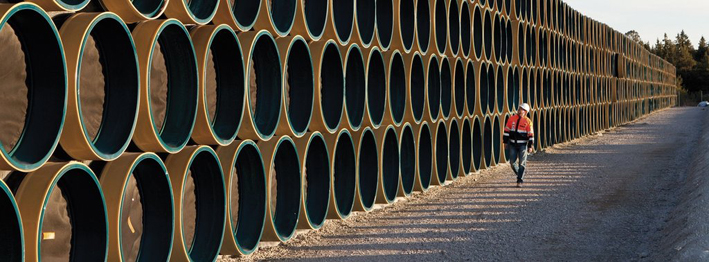EU countries have reached a compromise in the Council of the European Union on changing the Gas Directive, which could seriously interfere with the Gazprom’s project Nord Stream-2. According to the Kommersant’s information, this option gives Gazprom a chance to avoid serious negative consequences for the project, since Germany will negotiate the application of the Directive. But the very adoption of the Directive may still complicate and delay the start of the gas pipeline operation. In any case, the Directive will still be finalized by the EU Council and the European Parliament, and its final version may look different.
On February 8, permanent representatives of the EU member states to the EU Council approved amendments to the Gas Directive, opening the way for its revision with the participation of representatives of the Council, the European Parliament and the European Commission. These amendments, aimed against the Nord Stream-2 gas pipeline, which Gazprom is laying on the bottom of the Baltic Sea to Germany, were intended to extend to the draft EU norms. Berlin blocked the consideration of the amendments for a year and a half, but because of the change in the position of France was forced to agree in principle to their introduction.
The German Chancellor Angela Merkel first, even before the EU Council, reported that the differences on the draft Directive with Paris had been overcome. She also said that Berlin would not rely only on Russian gas and was ready to buy liquefied gas too, from which it can be concluded that Germany has not refused to support the Nord Stream-2 project. Germany and France at the last moment made joint proposals to change the draft Directive.
The main innovation was that the EU country, where the first gas pipeline connection point from a third country with the gas system of a member of the Union is located, has the authority to negotiate the application of the Directive.
In the case of Nord Stream-2, this means that it is up to Germany to decide to what extent the Directive will apply to the pipeline.
Peter Altmeyer, the German Economy Minister, said in an interview with the Welt am Sonntag on February 10:
“Recently, there has been a lot of ideologically motivated criticism of this project, which is so important for our energy supply”.
But if the amendments are approved in this form, problems still can not be avoided. First, if Nord Stream-2 is built after the date of entry of the amendments into force, it will not be able to get an exception from the EU Third Energy Package under the simplified procedure (without exception, it will have to separate the owner of the pipe and the gas supplier and give access to third parties to the capacities of the gas pipeline). Instead, Germany and Russia will have to conclude a special agreement on the legal regime of the gas pipeline.

Nord Stream 2 at a glance
The Nord Stream 2 Pipeline will transport natural gas into the European Union to enhance security of supply, support climate goals and strengthen the internal energy market.
The planned pipeline route will cross the territorial waters of Russia, Denmark and Germany, along with the Exclusive Economic Zones (EEZ) of Russia, Finland, Sweden, Denmark and Germany.
The EU’s domestic gas production is in rapid decline. To meet demand, the EU needs reliable, affordable and sustainable new gas supplies. The Nord Stream 2 Pipeline will provide this by transporting gas from the world’s largest reserves in Russia to the EU internal market.
Natural gas is a lower-carbon fuel that can replace other fossil fuels in the energy mix and deliver a reliable output to complement intermittent renewable energy. Nord Stream 2 will enhance the EU’s security of supply and complement, not replace, existing gas supply options.
KeyFacts Energy Industry Directory: Rusmininfo
 KEYFACT Energy
KEYFACT Energy